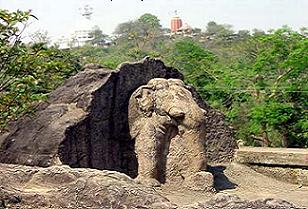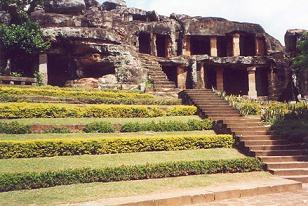There is a great deal of talk about peace, non-violence and co-operation among nations today. Few people know that Emperor Ashoka was the first king to adopt these principles as the benchmark of his political strategy.
The 21st century dawned with a new hope of peace and co-operation in the Indian subcontinent. There was general consensus in the world that mankind can survive only if all conflicts can be resolved by peaceful negotiations. Undoubtedly, there is just one dream that shines resplendently in the hearts of all right-thinking people in the world as the first decade of the new century hits its middle years. Will the future bring peace to our strife-torn, terror-threatened world?
The answer depends upon whether those who wield financial, political and cultural power are willing open their eyes and clearly perceive the road map for creating a world where peace, non-violence and security for all can be a distinct possibility. In an age riddled with aggression, greed, hatred and mindless violence, this is not going to be easy. But thankfully, we Indians can hark back to the guidelines laid down by great men of our history, who have not only left behind monuments worthy of veneration, but also shining examples by their own life-graphs for us to emulate.
Those who dream of seeing a world order based on respect for all forms of life, equality, conservation of a healthy environment and dedication to a knowledge-based lifestyle, have only to go back into India’s rich history to see how these objectives were set up as clear political strategies by great men like Emperor Ashoka, about whom rare words of praise have been written by internationally-acknowledged authors like H.G.Wells. Wells describes this great apostle of peace and non-violence in the following words: “Out of the thousands of names of kings that crowd the pages of history, the name of Ashoka alone shines like a star! From the Volga to Japan, his name is still honored…”
Ashoka became the Emperor of Magadha in 272 BC. His empire extended from Afghanistan to Mysore in the south. He founded the city of Shrinagar, the capital of Jammu Kashmir today. Eight years later, he conquered Kalinga in a bloody war, causing colossal death and suffering. Significantly, Ashoka’s self-search for peace and non-violence came after this carnage in Kalinga, in which his marauding armies killed 50,000 of people. The gruesome sight of mangled bodies on the battlefield struck his conscience so deeply, that he instantly gave up his greed of Dig-Vijaya (military conquest) and worked for Dhamma-Vijaya (victory of morality). From the fearful Chand Ashoka, he became Dhamma Ashoka, who declared that the only true victory was the conquest of people’s hearts! Ashoka’s change of heart is a historic event in the annals of world history because it changed the entire basis of a ruler’s strategy for ruling diverse communities of people living under his banner. Emperor Ashoka, who built one of the largest empires in history, remained secular, spiritual, peaceful, non-violent and became the founder of value-based politics.
Accepting Buddhism as his canon, he developed an ethical code free from all religious dogma and preached peace and non-violence through his concept of Dhamma Vijaya, which included the welfare of not only his own subjects, but that of all people living in lands beyond the borders of his empire. As a devout Buddhist, he raised Buddhism from being a local sectarian creed to one of the world’s greatest religions! Ashoka left behind 36 rock and metal inscriptions and edicts – discovered in diverse sites from Afghanistan to Sri Lanka – to enshrine his concept of Dhamma Vijaya, the bedrock of his political strategy for the rest of his life! His edicts included the best streams of philosophy of Hinduism and Buddhism.
However, his rock inscription at Dhauli, Orissa, is perhaps the quintessence of the simple four-fold path to Nirvana, which he advised all people to take. Leaving complex philosophical or religious doctrines behind, he decreed that every citizen would attain Nirvana in this life and in the next world if only he followed four simple rules.
“The sound of our drums (Bheri Ghosha),” he said, “Will now become the sound of morality, which gives people the maha mantras of everlasting peace”:
One: Honour holy men and women of all denominations and their teachings. For, they are the fonts of wisdom and morality. Respect them for their knowledge and sagacity. Strive for self-control and purity of mind. Devanamapriya Priyadarshan (Ashoka) says that giving to life whatever you have received from it is Dhammadana.
Two: Treat all elders and your mother and father with love and respect. Be sure to give them every service and devotion. Provide them with all comforts for they created you and your world.
Three: Devanamapriya Priyadarshan (Ashoka) considers it his duty to promote the welfare of all men. It is Dhamma, (moral code) to treat all human beings, including servants and slaves, as equals. Truth, non-violence, kindness and forgiveness are the pillars of human behavior. All conquests must result in vijaya pritirasa (victory of love), for this alone is merit in the world beyond.
Four: Cherish life in all forms. Acknowledge your debt to nature and every living creature by looking after these, for they make your life richer and secure. Do not hurt any living being. Even the smallest act of love, Devanamapriya Priyadarshan considers to be productive of great fruit.
More than two millenniums have passed since these words were engraved on stone in the 3rd century BC. The world acknowledges today that history has seldom produced one like Ashoka. He towers over all great monarchs of the world as the pioneer of Dhamma as the best political strategy for a ruler. He is the earliest promoter of a society, which is held together by a non-religious civil code, secularism, equality and environmental conservation.
It is time we re-discovered these simple principles to make the future a safe and secure era for the whole world!
Also read
1. Did Ahimsa get India freedom
2. Why has Ascetism led to the weakening of Bharat
3. Impact of Ahima on post Nehruvian India
 |
 |
| Ashoka rock edict at Dhauli |
Ashoka Dhauli Shanti Stupa |